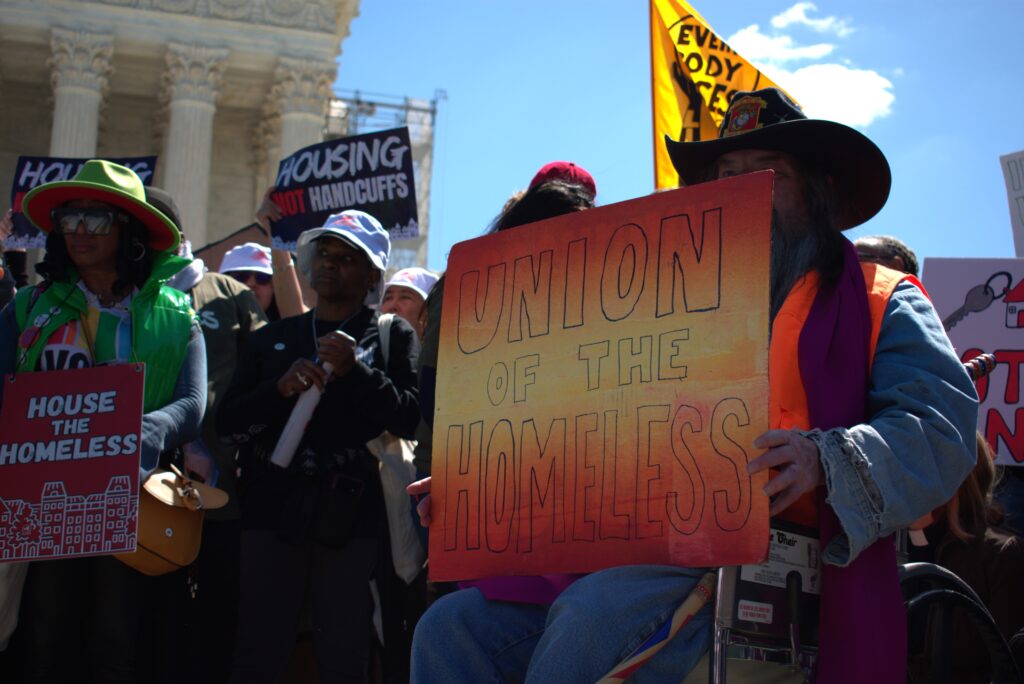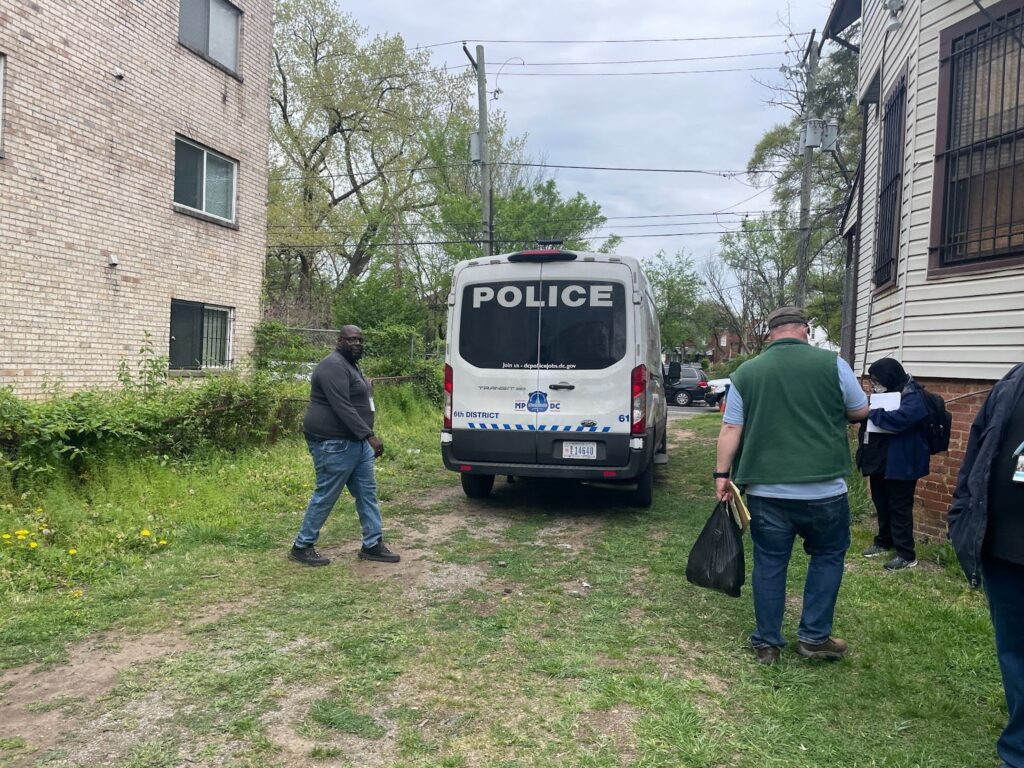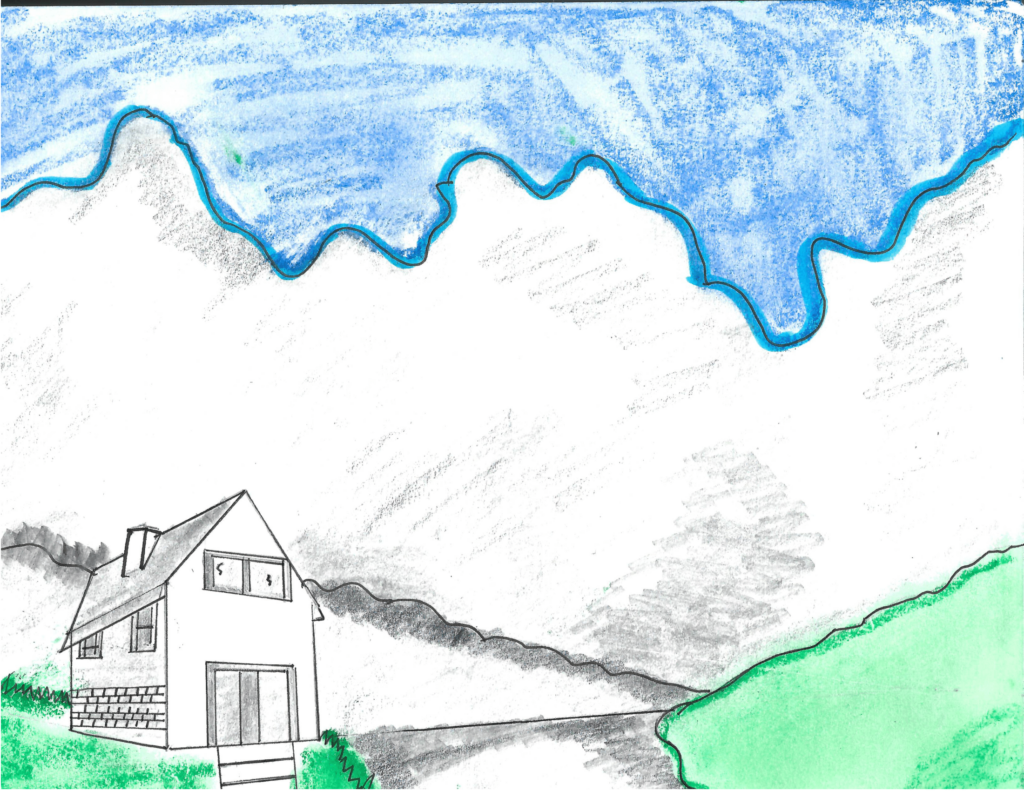On the morning of April 22, hundreds of people gathered outside the Supreme Court to protest the criminalization of homelessness, while justices heard oral arguments in a landmark case that could have staggering implications for the future of homelessness policy in the country.
The rally, titled “Housing not Handcuffs,” was organized by the National Homelessness Law Center and the National Coalition for the Homeless and co-sponsored by dozens of other local and national organizations.
Simultaneously, inside the building, the Supreme Court heard the oral arguments for Johnson v. Grants Pass. The hearing aimed to assess if enforcing laws against sleeping outside, when there is no other available shelter, constitutes “cruel and unusual punishment.” Should the Supreme Court rule against Johnson, unhoused people across the country could face criminal or financial prosecution for sleeping, as well as using blankets and pillows, in public spaces.
“We should have realized a long time ago that we cannot arrest our way out of issues,” said Donald Whitehead, the executive director of the National Coalition for the Homeless, in his speech in front of the Supreme Court. “People don’t choose to be homeless. They are forced into homelessness by a social safety net riddled with holes.”
Originally filed in 2018, Johnson v. Grants Pass started when Gloria Johnson, Debra Blake, and John Logan, all of whom were living on the streets in the city of Grants Pass, Oregon, sued the city for issuing tickets — with fines of up to $295 — to unhoused people for sleeping in public spaces. Blake has since passed away, and Johnson and Logan are named plaintiffs in the case.
The criminalization of homelessness is a rising trend across the country, with more states passing legislation that makes it illegal for unhoused people to perform life-sustaining activities like sleeping in public spaces, despite a dearth of alternatives.
“This is based out of a small town, but it will have an impact across the world,” said Sam Hozian, the communications assistant with the National Homelessness Law Center, in an interview with Street Sense. “This is the most important case about homelessness in 40 years.”
The Supreme Court declined to hear the petition of Boise for Martin v. Boise in 2018, which set the precedent that people who are involuntarily homeless cannot be punished just for sleeping outside if they have nowhere else to go. Since 2018, the Supreme Court has shifted more conservative with the appointment of Amy Coney Barrett in 2020, issuing rulings that curtailed affirmative action in college admissions and allowed states to enact more restrictive abortion bans.
“You can’t not give people housing and then arrest them for being outside,” said Rachelle Ellison, the assistant director for the People for Fairness Coalition, in an interview with Street Sense. “That is insanity.”
At the rally’s start at 8:30 a.m., protestors covered themselves in thermal blankets in solidarity with the people of Grant’s Pass, who are currently unable to sleep outdoors with blankets without risking fines.
Organizers served breakfast and led the growing crowd in chants, including “SCOTUS, now is the time, homeless is not a crime,” before speakers addressed the group.
“We are here to tell the truth,” said Reverend William Barber, co-chair of the Poor People’s Campaign, in his speech at the rally. “When we don’t tell the truth about homelessness, then folks lie about people.”
Barber specifically critiqued a report, written by conservative Christopher Rufo, that claimed that homelessness can be primarily attributed to addiction and mental illness.
“[Policymakers] are trying to isolate and blame a small group of people for policy decisions that hurt more than half of America,” Barber continued. “Our economic system is addicted to greed and predatory capitalism instead of justice and compassion and a commitment to housing and a social safety net.”
Each speaker emphasized that homelessness was a systemic problem, not an individual failing, and that cities should focus on expanding housing opportunities rather than punitive measures.
“Homelessness is, and has always been, a matter of political will,” said James Durrah, Chief Communications Officer at Miriam’s Kitchen. “Not scarcity of resources, but the immoral allocation of resources. Not a lack of evidence of what works, but an overreliance on police in the absence of moral leadership.”
Homelessness does not have an equal impact on everyone, however — a fact many speakers emphasized. Black and Indigenous Americans are far more likely to experience homelessness than other groups, and one in four queer youth report experiencing homelessness or housing instability at some point in their lives.
Organizations from across the country showed up in solidarity with protestors, highlighting the potential reverberation a SCOTUS decision could have on states like Tennessee, Oregon, New York, Louisiana, and Texas. Josh Spring, the executive director for the Greater Cincinnati Homeless Coalition, said he traveled to Washington, D.C. to advocate for the “pursuit of justice.”
“We have to be clear we are here and we are together,” Spring said.
Many speakers and attendees, including Helen Cruz, are currently or were formerly experiencing homelessness. Cruz, a lifelong resident of Grants Pass, amassed more than $5,000 in fines from just sleeping in a public park during the six years that she was unhoused.
“In all of my years of being homeless, the only thing I wanted was to be heard,” Cruz said. “We are still human and it is not okay to put us in a category that we are anything else.”
Several vendors with Street Sense also attended the rally.
“This is an act of entrapment, meant to dehumanize homeless people,” said Nathaniel Piscitelli, who joined Street Sense as a temporary vendor two weeks ago. “If a millionaire were homeless, that would matter to people.”
As the rally continued, Jesse Rabinowitz, the campaign and communications director for the National Homelessness Law Center, would pause and read updates from inside the court, often to either scornful shouts of “that ain’t right” or applause.
“For a person who has no place to go, sleeping in public is kind of like breathing in public,” Justice Elena Kagan said.
Following the rally, organizers announced lunch and further programming at the Church of the Reformation.
Throughout the protest, organizers and attendees mingled, exchanging phone numbers and talking about their lives. To many, community-building was the central purpose of the rally, since the Supreme Court decision is slated to be released in June.
“I want people to know that the housing justice movement doesn’t start or end today,” Hozian said. “We showed up and we built something meaningful.”








